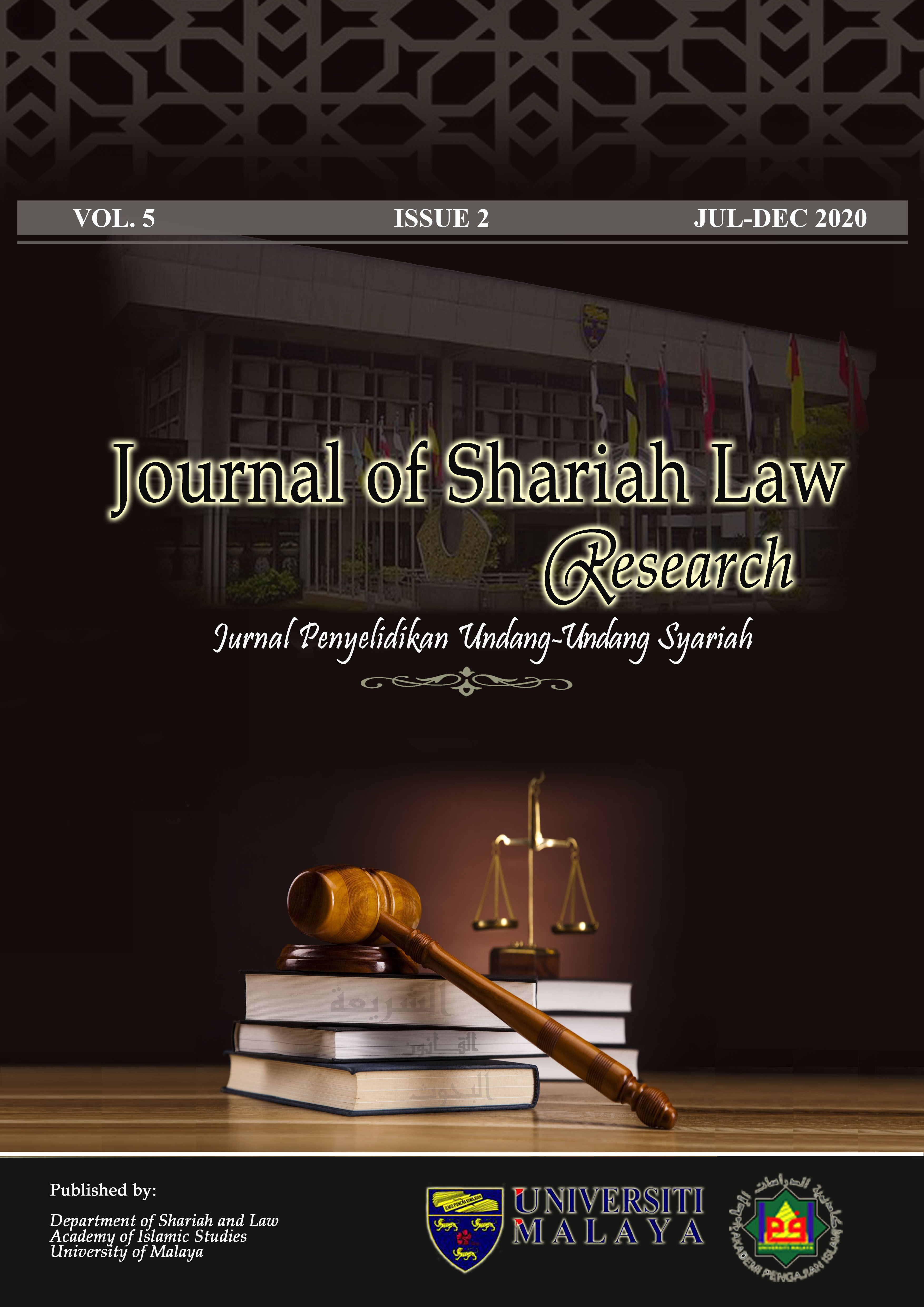THE PRINCIPLE OF JUSTICE FOR THE POOR: ITS IMPLEMENTATION IN CHARITABLE INSTITUTIONS IN INDONESIA AND THE STATE PHILOSOPHY OF PANCASILA
DOI:
https://doi.org/10.22452/jslr.vol5no2.1Keywords:
principle of justice, empowering the poor, Pancasila, Dompet Dhuafa RepublikaAbstract
Charitable Institution of zakÄh in Shariah economic system in Indonesia growing quite fast. Until the year of 2012 was recorded that there has been 19 zakÄh receiver institutions that appointed by Directorate General of Taxes, that has been implementing their activities to collect and distribute zakÄh. The growth of zakÄh charitable institutions turns out have an impact on poor community empowerment in several places in Indonesia. Through some of their programs, like “Dompet Dhuafa Republika†that managing productive zakÄh, has been created opportunity to the poor community to improving their living standard so they would not depend on others. ZakÄh charitable attempts to help the life of the poor community actually is the essence of embodiment for principle of justice that exist on the Shariah economic system. That principle of justice also have similarity with the principle of social justice that consist in the philosophy state of Indonesia, that is Pancasila, especially the 5th Principle (Sila ke-5). This paper will do the comparative study between principle of justice in economy sector that implemented by the zakÄh charitable institution in Indonesia and in the Pancasila principle, particularly with the connection of both systems to empowering and giving the justice in economy sector for the poor community.
Downloads
References
Ahmad Azhar Basyir (1993). Refleksi atas Persoalan Keislaman. Bandung: Mizan.
Ahmad Juwaini (2012). Indonesia Poverty Outlook 2013. Jakarta: Dompet Dhuafa.
Ahmad Warson Munawwir (1994). Kamus Bahasa Arab Indonesia. Yogyakarta: Pesantren Al-Munawwir.
Asghar Ali Engineer (1999). Islam dan Teologi Pembebasan. Yogyakarta: Pustaka Pelajar.
Badan Pusat Statistik, <http://data.tnp2k.go.id/index.php?q=content/profil-kemiskinan-di-indonesia>, accessed on 26 December 2012.
Departemen Pendidikan dan Kebudayaan Republik Indonesia (1990). Kamus Besar Bahasa Indonesia. Jakarta: Departemen Pendidikan dan Kebudayaan dan Balai Pustaka.
Dompet Dhuafa Republika, “Profil Relief,” <http://www.dompetdhuafa.org/relief/profil-relief/>, accessed on 29 November 2012.
Dompet Dhuafa Republika, “Profil Sejarah,” <http://www.dompetdhuafa.org/profil/sejarah/>, accessed on 29 November 2012.
Dompet Dhuafa Republika, “Program Ekonomi Pemberdayaan Masyarakat Urban,” <http://www.dompetdhuafa.org/program/ekonomi/pemberdaya an-masyarakat-urban/>, accessed on 29 November 2012.
Dompet Dhuafa Republika, “Program Ekonomi Pemberdayaan Masyarakat Rural,” <http://www.dompetdhuafa.org/program/ekonomi/pemberdaya an-masyarakat-rural/>, accessed on 29 November 2012.
Dompet Dhuafa Republika, “Smart ei Ekselensia Indonesia,” http://www.dompetdhuafa.org/smart-ei-ekselensia-indonesia-2/, accessed on 29 November 2012.
Fazlur Rahman (1982). Islam and Modernity, Transformation of Intelectual Tradition. Chicago: The University of Chicago Press.
Harun Nasution (1994). Islam Rasional. Bandung: Mizan.
Ibn Ḥajar (n.d.). Fatḥ al-Bārī, Sharḥ Ṣaḥīḥ al-Bukhārī. Bayrūt: n.p.
Jimly Asshiddiqie (2010). Konstitusi Ekonomi. Jakarta: Penerbit Buku Kompas.
M. Dawam Raharjo (1996). Ensiklopedi Al-Qur’an: Tafsir Sosial Berdasarkan Konsep-Konsep Kunci. Jakarta: Paramadina.
M. Djamal Doa (2001). Manfaat Zakat Dikelola Negara. Jakarta: Yayasan Nuansa Madani.
M. Quraisy Shihab (2008). Lentera Al-Qur’an. Bandung: Mizan.
Majid Kahduri (1984). The Islamic Conception of Justice. n.p.: n.p.
Mannan (1970). Islamic Economics: Theory and Practice. Lahore, n.d.
Maria Farida Indrati S. (2007). Ilmu Perundangan-Undangan: Jenis, Fungsi dan Materi Muatan. Yogyakarta: Kanisius.
Marwah M. Diah (2003). Restrukturisasi BUMN di Indonesia: Privatisasi atau Korporatisasi?. S.L.: Literata Lintas Media.
Masdar Farid Mas’udi (1993). Agama Keadilan: Risalah Zakat (Pajak) Dalam Islam. Jakarta: Pustaka Firdaus.
Mochamad Isnaeni Ramdhan (2009). “Pancasila sebagai Grand Design Pengkajian Konstitusi, in Memahami Hukum: Dari Konstruksi Sampai Implementasi,” ed. Satya Arinanto & Ninuk Triyanti. Jakarta: Rajawali Pers, 232.
Muḥammad Fu‘ad ‘Abd al-Bāqī (1981). al-Mu‘jam al-Mufahras li Alfāẓ al-Qur’ān al-Karīm. Miṣr: Dār al-Fikr.
Padmo Wahjono (1991). Membudayakan Undang-Undang Dasar 1945. Jakarta: Ind-Hill-Co.
Revrisond Baswir (2006). “Ekonomi Kerakyatan: Ekonomi Rakyat dan Koperasi sebagai Sokoguru Perekonomian Nasional,” J. Sosial dan Humaniora.
Sayyid Qutb (n.d.). Keadilan Sosial dalam Islam. Bandung: Penerbit Pustaka.
Seyyed Hosein Nasr (2003). The Heart of Islam. Bandung: Mizan.
Sri Edi Swasono (2005). Indonesia dan Doktrin Kesejahteraan Sosial: Dari Klasikal dan Neoklasikal Sampai ke The End of Laissez-Faire. Jakarta: Penerbit Perkumpulan Prakarsa.
Tim Ichtiar Baru Van Hoeve (2000). Ensiklopedi Hukum Islam. Jakarta: Ichtiar Baru Van Hoeve.
Yūsuf al-Qaraḍāwī (1969). Fiqh al-Zakāh I. Bayrūt: Dār al-Irshād.
List of Statutes
Law Number 23 Year 2011 regarding Zakat Management, Indonesia.
Downloads
Published
How to Cite
Issue
Section
License

This work is licensed under a Creative Commons Attribution-NonCommercial 4.0 International License.








